The majority of Mustang is part of the Annapurna Conservation Area and also borders in the North with Tibet.
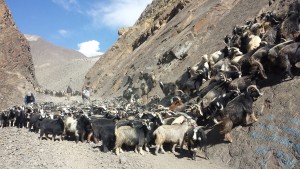
“Goat traffic”
We flew in to Eklebhatti, where a 4×4 Land Cruiser was waiting for us to continue the journey. The car ride was bumpy and was continuously interrupted due to several goat herds that were blocking the roads that were heading down South from the mountains into towns and cities. End of September and early October, the Nepalese celebrate the biggest festival of the year: Dashain Festival.
It is a very important religious festival where thousands of goats, sheep, water buffalos, ducks and chickens are prepared for great slaughter, and hence many herd leaders walk down into the towns to sell their goats or sheep.
It took us a 1 ½ hours car ride to reach our first teahouse, where we would be overstaying the night. Teahouses are like small hotels or guesthouses built of clay, wood or stones (depending from the area), offering shared sleeping arrangements, food, showers and toilets. I had to inform our host in advance that I would like to have a shower in the evening, as the water was boiled on a fireplace, and then placed in a bucket into the shower room at the arranged time.
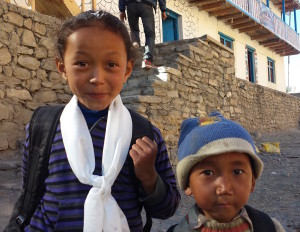
The two cute kids traveling with us
The teahouse was filled with many Nepalese kids from the village. However, two of them a boy (like 6 years) and a girl (8 years) were just traveling through. Both of them go to a boarding school in Pokhara, and since the school holidays just started a few days earlier, they were both on the way back home to their villages in Upper Mustang. These kids travel with strangers that are willing or have the space to take them. They have some fixed stops, places the kids have to reach with the provided transportation, but then may end up in one place for one or two days until other travellers come along and are able to take them with.
Hence, the next morning we left together with those gorgeous kids who got a ride on our car as we were heading the same direction. In the meanwhile the host of the teahouse contacted the family of the kids and notified them at what time we will reach the meeting point with the families. I was so fascinated by those brave and well behaved kids, and how the communities support each other.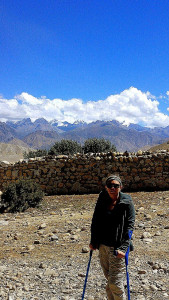
Crossing rivers or crossing “borders” can be quite adventurous in Nepal. I guess in this one day alone we changed cars a minimum of 3 times.
Either the road / river is not accessible to be crossed by car or there is a political reason behind. Obviously we pay for the car and driver to take us from A to B, but the moment we enter a different region of a different folk, they also want to make some money and oblige you to change cars and drivers. So there is a silent agreement amongst the locals when reaching the “border” cars and driver need to be swapped. Initially I found this irritating, but eventually it made total sense and I find it admiring how much they respect each other for letting everyone have a piece of the cake.
Upper Mustang’s scenery is stunning: quite rocky, dry and dusty, in some parts green and from most high spots you see the Annapurna mountain ranges covered with snow. The road became narrower at some point where only one car fitted on the road. A steep hillside on one side and a deep abyss on the other side started to make some of us a bit nervous. Finally we reach one of those car swapping locations: crossing a waterfall / river with all luggage by foot.
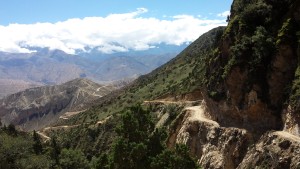
Adventurous – narrow roads !
I balanced with my crutches and my painful knee over the rocks through the stream, and with some help I made it over to the other side. If I thought this was a challenge then I was wrong. The next car was parked uphill and I had to push myself up there for 100m. The distance and ascent is nothing for those who have two healthy legs and are fit, but for me this was quite a push to my pain limits.
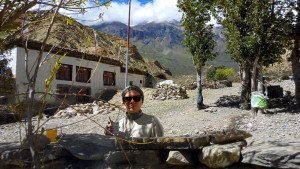
Tea break in a village after crossing the river
We eventually continued our drive from check point to check point where our travel permits had to be shown until reaching Lo Manthang.
In the meanwhile we handed over our two behaving kids to their parents, and searched for our next teahouse for the night.
Lo Manthang, at an elevation of 3,840 m, used to be the capital of the Kingdom of Lo until the 18th century and was a monarchy until 2008 when it became a region in Nepal. The King of Lo (Upper Mustang) – Jigme Dorje Palbar Bista – officially lost his title as king, but is today tolerated as the governor of the region. We had the honor to visit the prince in his royal palace for some tea, and it was an incredible to be welcomed in his home.
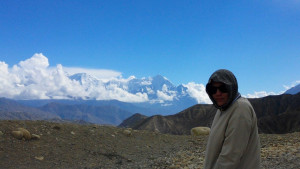
Stunning Views of the Himalaya